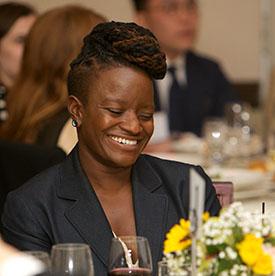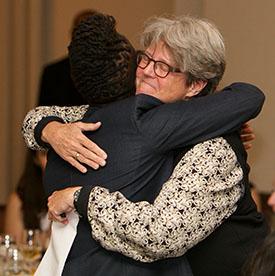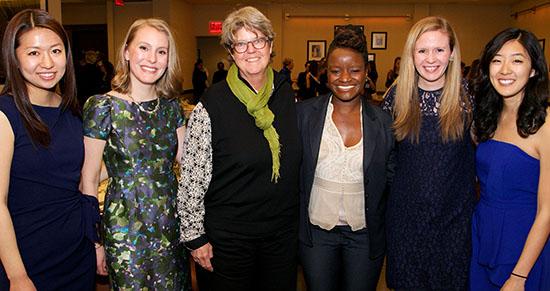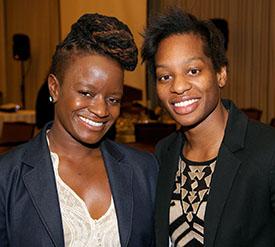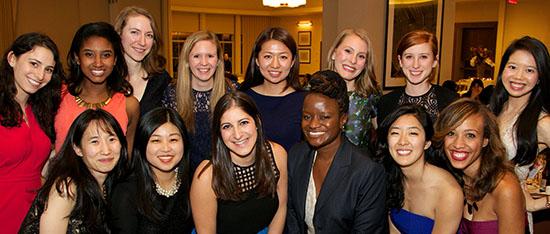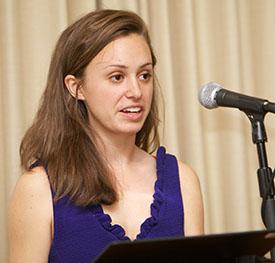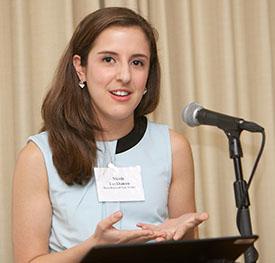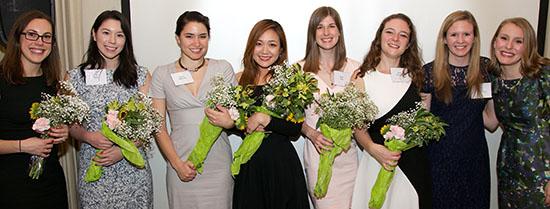Columbia Law Women's Association Honors LGBT Advocate Chinyere Ezie '10
The Civil Rights Lawyer Discussed her Landmark Win for Transgender Inmates' Rights, Urged Students to "Go Forth and Do Justice"
New York, April 13, 2016—When Columbia Law School graduate Chinyere Ezie ’10 began her dream job as a civil rights lawyer focused on LGBT issues in the South, she was “quaking in her boots,” said the 2016 honoree at the 36th annual Columbia Law Women’s Association Myra Bradwell Dinner on March 24.
Now, fewer than six years after graduating, Ezie has successfully litigated the landmark case Diamond v. Owens for the Southern Poverty Law Center, leading the Department of Justice to step in and demand better treatment for transgender prisoners.
“The work she is doing with the Southern Poverty Law Center is taking the organization’s work in a whole new direction,” said Professor Katherine Franke, who was one of Ezie’s mentors during law school, and introduced her at the dinner. “They’re thinking about trans and LGBT rights in the Southern context, so they’re necessarily intersectional cases that raise discrimination and poverty law issues, and issues having to do with mass incarceration. It’s really cutting-edge work and no one else is doing it.”
| Chinyere Ezie '10, 2016 honoree at the 36th annual Columbia Law Women’s Association Myra Bradwell Dinner, laughs as Professor Katherine Franke, one of her mentors, introduces her, followed by a warm hug ahead of Ezie's speech. |
Before an audience of students, faculty, family, and friends, Ezie described her “hazy path” to where she is today as a “series of reinventions.” But her dream has been clear: to be a social justice advocate and civil rights lawyer.
Franke, the Isidor and Seville Sulzbacher Professor of Law and director of the Law School’s Center for Gender and Sexuality Law, was tasked in 2007 with convincing Ezie, who was interested in a career in public interest law, to choose Columbia over Yale Law School; she explained the story of their “meeting” as a two-hour phone conversation on the side of the New York State Thruway. Nearly 10 years later, it was Franke who nominated Ezie for the Myra Bradwell award.
| Chinyere Ezie and Professor Katherine Franke pose with CLWA presidents Andrea Kozak '17 and Kate Walsh '17 (left and right middle) and CLWA Myra Bradwell Chairs Lanna Lan '17 and Joanne Liu '17 (left and right outer). |
The award is granted by the Columbia Law Women’s Association, a student organization, each year at a dinner honoring Myra Bradwell, the first female lawyer in Illinois. After being denied admission to the Illinois state bar because she was a married woman, Bradwell appealed her case to the U.S. Supreme Court in 1873. While the high court upheld the ruling, she was eventually admitted to the bar.
“Were Bradwell alive today I would say the same to her,” Franke said, recalling her first conversation with Ezie. “University of Illinois—good school. Columbia—the school for you,” she said to laughter from students.
Ezie came to Columbia Law School after doing a Fulbright scholarship in Mauritius, where she conducted research on gender relations and worker’s rights. “I realized that writing about injustices in objective terms in the hopes that others would take action was not something that could sustain me. Because I wanted to be an advocate, I wanted to be in the driver’s seat,” she said. “And so that year I reinvented myself for the first time, and applied to law school seemingly on a whim.”
| Chinyere Ezie '10 (left) with her wife Nicole Humphrey '12 (right), whom she met at Columbia Law School. |
Ezie met her now-wife, Nicole Humphrey ’12 at Columbia Law School, the place where she “found my voice as a queer woman of African and African American descent.”
Following graduation in 2010, Ezie clerked on the U.S. Court of Appeals for the Sixth Circuit and worked as a litigation associate at Cleary Gottlieb Steen and Hamilton LLP, where she began doing civil rights work.
In 2014, Ezie became a staff attorney at the Southern Poverty Law Center’s LGBT Rights Project in Montgomery, Alabama. Several weeks in she met Ashley Diamond, a trans woman then in the custody of a Georgia prison, who had been denied the hormone therapy treatments she had been taking for 17 years, and faced repeated sexual assaults in the all-male prison she was being held, despite her pleas to be housed with females.
“When I first met Ashley I saw someone who was beaten but not yet broken,” Ezie said. “She understood her mistreatment as part of a bigger problem, and she wanted to become an advocate for the broader LGBT community.” They filed a federal lawsuit alleging that Georgia was violating the 8th amendment.
“At that time, little did we know that Ashley and I were about to change the world,” Ezie continued.
The impact of the lawsuit was sweeping: the Department of Justice issued a statement saying prison officials who refuse gender dysphoria treatment to inmates violated the 8th Amendment; the case was featured on the cover of The New York Times and covered by reporters around the world; Georgia rescinded its policy of restricting gender dysphoria treatment, and other states like Texas and Alabama followed suit; Georgia issued a new policy on sexual assault prevention and committed to training prison staff on health and safety measures for the transgender community; Diamond was released from prison 3.5 years into her 12-year sentence for reasons of public welfare, and received a six figure monetary settlement.
And, “just last month, inspired by our lawsuit and the abuses it revealed, the Department of Justice commenced its first-ever investigation into the welfare of LGBT prisoners, focusing on the state of Georgia,” said Ezie.
| Chinyere Ezie stands with members of CLWA (from left to right, back row: Hilary Greenwald '17, Antonia Hyman '18, Abigail Cooper '17, Kate Walsh '17, Lanna Lan '17, Andrea Kozak '17, Laura Claire Baron '18, Alison Liou '17; front row: Sunny Kim '18, Clara Kim '17, Sabrina Singer '18, Chinyere Ezie '10, Joanne Liu '17, Ashley Lherisson '17). |
She concluded her speech at Columbia University’s Faculty House by reminding students that the fight for civil rights is far from over, citing continued prevalence of racism, sexism, anti-immigrant sentiment, and dangerous actions against LGBT individuals, urging attendees to “go forth and do justice.”
“These past five years have taught me an invaluable lesson: that being on a path that’s hazy is not fatal to achieving your dreams,” she said. “Rather, the only thing that is, is giving up.”
Also honored during the evening was Myra Bradwell Note Winner Nicole Taykhman ’16, for her piece in the Columbia Journal of Gender and Law titled “Defying the Silence: Immigrant Women Workers, Wage Theft, and Anti-Retaliation Policy in the States.” Sarah Mac Dougall ’16, editor-in-chief of the journal, introduced Taykhman.
| Sarah Mac Dougall ’16 (left), editor-in-chief of the Columbia Journal of Gender and Law, introduces this year's Myra Bradwell Note Winner, Nicole Taykhman ’16 (right). |
Columbia Law Women’s Association Co-Presidents Andrea Kozak ’17 and Kate Walsh ’17 , along with Myra Bradwell Chairs Lanna Lan ’17 and Joanne Liu ’17, bid farewell to graduating board members.
| Graduating board members are bid farewell by current CLWA presidents Kate Walsh and Andrea Kozak (from left to right: Katie Coulson '16, Cat Djang 16, Allison Heimann '16, MK Han '16, Kelly Finn '16, Nicole Tortoriello '16, Kate Walsh '17, Andrea Kozak '17). |
